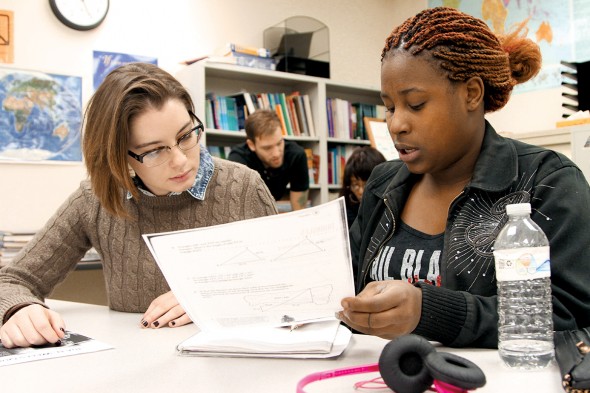Center for Literacy opens a world of possibilities

UIC graduate student Emma Hardy, left, works with GED student Alethia Jackson at the Garfield Community Services Center. Hardy is a volunteer with the UIC Center for Literacy. Photo: S.K. Vemmer/UIC News
As he starts his fifth year as a community volunteer with the UIC Center for Literacy, Donald Wilson still feels as he did when he started: appreciative.
“You learn a lot about yourself when you’re helping other people on a regular basis,” Wilson said.
“You don’t know their situation and maybe on that day, you’re opening a world of possibilities to them.”
Wilson’s experience is common among the 25 volunteers at the College of Education center, which collaborates with the Chicago Department of Family and Support Services to improve literacy in the community.
The center’s services include English as a Second Language and GED courses through its Family Start Learning Centers.
Volunteers — UIC students, employees and community members — are always needed.
Since the GED entrance exam changed Dec. 31, increasing in difficulty, the center is looking for more volunteers to keep up, said research specialist Sharon Osinaike, who coordinates the volunteer program.
“We had a huge influx of people,” she said. “We may have 18 students and only four tutors to match them up with.”
Volunteers are also needed to help with service activities, resource dissemination and special events.
Most of the people who come to the Literacy Center are parents who dropped out of high school and want to get their GED, Osinaike said. The program has 100 people enrolled in the GED program. Last year the program graduated 81 students, with many eventually attending UIC, she said.
Freshman Omoniyi Alimi, who tutors GED students in algebra and geometry, said she finds the experience rewarding.
“I think the appeal of just being able to help people get their GED is what spoke to me,” said Alimi, a biology major in the Honors College. “When you volunteer, you’re doing it from the heart and you don’t expect anything in return.”
For MBA student William Cui, who moved to Chicago a year ago from China, being a math tutor gives him the chance to help others and experience American culture.
“They provide an opportunity to know about American society and communicate with American people,” he said. “Communicating with the students is very important — the job is not only to help the students, but also to help myself.”
For more information on the program or to volunteer, email osinaike@uic.edu or call 312-413-9869.
